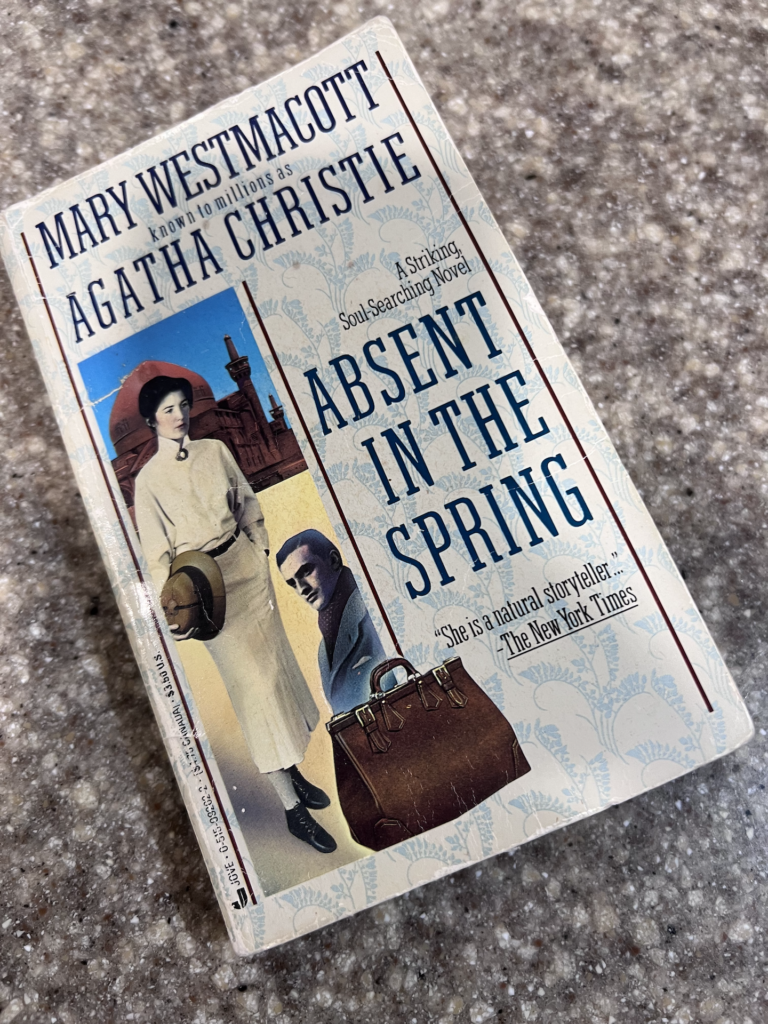“And now, just a special word. No lazy thinking, Joan, my dear! Don’t just accept things at their face value—because it is the easiest way, and because it may save you pain! Life is meant to be lived, not glossed over. And don’t be too pleased with yourself!”

My favorite sentence: “And suddenly, discordantly, a thought slipped and flashed sideways across the panorama of Joan’s mind, much as she noticed a snake flash and slip in front of the car only yesterday—a mere streak of writhing green, gone almost before you saw it.”
Life is Meant to Be Lived
What does a famous author do, such as Agatha Christie, when she wants the “freedom to explore her most private and precious imaginative garden?” She uses the pseudonym Mary Westmacott. According to Agatha’s daughter, Rosalind Hicks, the six stories written under the Mary Westmacott name were “bitter-sweet stories about love.”
This month, we are reading the Mary Westmacott book, Absent in the Spring, written in 1944.
According to Agatha, “I wrote that book in three days flat… I went straight through…I don’t think I have ever been so tired.. I didn’t want to change a word and although I don’t know myself of course what it is really like, it was written as I meant to write it, and that is the proudest joy an author can have.”
It is “the one book that I had always wanted to write, that had been clear in my mind. It was the picture of a woman with a complete image of herself, of what she was, but about which she was completely mistaken. Through her own actions, her own feelings and thoughts, this would be revealed to the reader. She would be, as it were, continually meeting herself, not recognizing herself, but becoming increasingly uneasy. What brought about this revelation would be the fact that for the first time in her life she was alone—completely alone—for four or five days.” (Family memories from www.agathachristie.com)
Fast forward eighty years to our current year 2024. Can the modern reader relate?
It is not a happy story and does not give anyone a warm feeling that all is right in the world. The characters are not terribly likable. However, it is a believable story—a story that leaves one thinking, ‘but for the grace of God, go I.” The main character, Joan, though appearing outwardly critical of everything that doesn’t measure up to her standards, has developed a coherent inner moral compass, thoroughly consistent with upper-middle class British values and social norms, that guides her actions and interactions with others. Yet to maintain this stiff-upper lip attitude, she has created a reality all her own.
The first two sentences of the novel are revelatory:
“Joan Scudamore screwed up her eyes as she peered across the dimness of the Resthouse dining room. She was slightly shortsighted.”
She lives life with blinders on. She doesn’t peer too far into the distance or too deeply into the abyss.
While reading the story, one wants to take Joan by the shoulders and shake her to wake her up. But as the author points out, we encounter her during the only time in her life when she is completely alone. And it is fascinating how solitude has given her a rare opportunity to peal back the layers of self-deception to slowly uncover the reality of her relationships with her husband and children.
I think the modern reader will react strongly to this story depending on where they are in life. It may serve as a precautionary tale, or it may cause extreme self-reflection regarding one’s own relationships with those whom they love. It is depressive and frustrating because as a reader, we know more than what Joan knows, and we want her to stop stifling her thoughts that are revealing important truths about her life. Nonetheless, it is hard to put down. Will this experience change her life? Who amongst us will allow a miraculous event to change our fundamental direction in life?
i